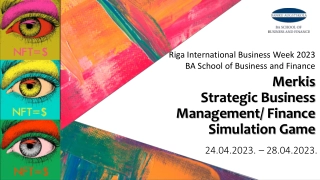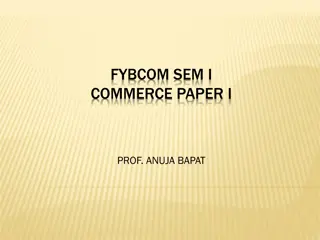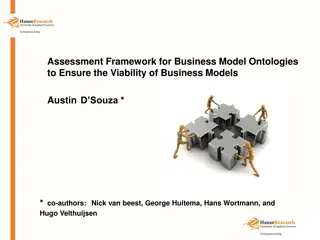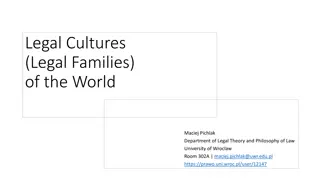Overview of Law and Business Law
The content discusses the fundamental concepts of law, including its essential characteristics and sources, followed by an explanation of business law focusing on trade, commerce, and mercantile transactions. It emphasizes the importance of laws in regulating social conduct, transactions, and business activities, highlighting the different sources that contribute to the legal framework.
Download Presentation

Please find below an Image/Link to download the presentation.
The content on the website is provided AS IS for your information and personal use only. It may not be sold, licensed, or shared on other websites without obtaining consent from the author.If you encounter any issues during the download, it is possible that the publisher has removed the file from their server.
You are allowed to download the files provided on this website for personal or commercial use, subject to the condition that they are used lawfully. All files are the property of their respective owners.
The content on the website is provided AS IS for your information and personal use only. It may not be sold, licensed, or shared on other websites without obtaining consent from the author.
E N D
Presentation Transcript
CHAPTER 1 : INTRODUCTION OF CONTRACT AND KINDS OF CONTRACT
Law The term Law denotes set of rules and regulations, which govern the social conduct and which can be enforced through the courts. Law has been one of the most effective instruments for control of social relations and transactions from the ancient times. According to Salmond, Law is the body of principles recognized and applied by the state in the administration of justice.
essential characteristics of law Law presupposes a state. The state makes law as a rule relating to the actions of human beings. The law aims to regulate the external actions of human beings Law is enforced by the State. Law is applied in administration of justice. Law applies to all without discrimination, including the state, which itself is regulated by law Law is always supreme.
Sources of Law Statutes having their source in legislation made by the State; Customs and precedents, which over a period of time become as good as law; Common law, which though originated in the Great Britain, has now been well absorbed into the Indian legal system; International treaties and agreements; Judicial decisions and precedents; Miscellaneous e.g. juristic writings, literary works, foreign decisions etc.
WHAT IS BUSINESS LAW? According to S.R. Davar, business law means that branch of law which is applicable to or concerned with trade and commerce in connection with various mercantile or business transactions. As per Slater, The phrase Mercantile Law or Commercial Law is generally used to denote those portions of the law which deal with the rights and obligations arising out of transactions between mercantile persons.
Sources of Business Law The Lex Mercantoria, i.e. the Law Merchant, which emanated from the customs and usages, which are binding on traders in their dealings with each other. The Statute Law, which is derived from the legislation or enactments or the subordinate legislation made by the legislative bodies. The Common Law, which include the principles of law evolved by the judges in making decisions on cases that are brought before them. The Principles of Equity, which are neither the customs nor codified law, but are imperative dictates of conscience and have been set forth and developed in the Court of Chancery.
Contract According to Salmond, a contract is an agreement creating and defining obligation between the parties. Sir William Anson says, "A contract is an agreement enforceable by law, made between two or more persons, by which right are acquired by one or more to acts or forbearance on the part of other or others. According to section 2 (h) An agreement enforceable by law is a contract . As per the above definition under section 2 (h), the two important features of the contract are: (a) An agreement Contract (b) Its enforceability by law
An Agreement According to section 2 (e), every promise and every set of promises, consideration for agreement . Thus, the agreement is an outcome of the offer and acceptance between parties. i.e. Offer + acceptance = Agreement. forming other, the an each is
ESSENTIAL ELEMENTS OF A VALID CONTRACT (UNDER SECTION 10) Agreement: Republic Medico Surgical Co. vs. UOI. Intention to create legal relationship : Balfor vs. Balfor Free Consent : Consent is said to be free when it is not caused by Coercion, Undue influence, Fraud, Misrepresentation and Mistake. Contractual Capacity Lawful Consideration Lawful Object Certainty of Terms Agreement should not be Declared Void Legal Formalities
KINDS OF CONTRACTS (a) Contracts on basis of validity of a Contract Valid Contract , Voidable Contract, Void Contract, Illegal Agreement Un- Enforceable Contract (b) Classification of contract on the basics of mode of formation of contract Express Contract , Implied Contracts, Quasi Contracts (c) Classification on the Basis of Performance of Contract Executed Contracts , Executory Contract , Partly Executed and Partly Executory Contract, Unilateral Contracts , Bilateral Contracts
Classification of Contracts on the Basis of the Form of the Contracts Formal Contracts Simple Contracts
Difference between Illegal and Void Agreements (a) All the illegal agreements are void but all void agreements are not illegal. (b) Illegal agreements are void ab initio but a valid agreement may become void subsequently. (c) There is no punishment to the parties for a void agreement but parties to illegal agreements are punishable by law. (d) All the agreements, which are collateral to void agreements, are valid but agreements, which are collateral to illegal agreements, are void ab initio. (e) Void agreements are not illegal until they are proved to be so but illegal agreement are illegal from the very begin. (f) Void agreements can be void for various reasons as provided under the Contract Act but illegal agreement can be void due to provisions of others Acts also.
Void Agreement vs Voidable Contracts (1) An agreement not enforceable by the law is known as void agreement (section 2 (g)) where as voidable contract is an agreement which is enforceable at the option of one or more of the parties there to but not at the option of other or others. (Section 2 (i)). (2) Void agreement is not enforceable from the beginning itself and in no case it can be made enforceable by the party. Whereas voidable contract are void only at the option of aggrieved party and who can rescind it, however if aggrieved party does not want to rescind it then it remains valid and enforceable by law. (3) An agreement can be void if any of the essential elements of the agreement, as specified under section 10 of the Act is missing. Whereas voidable agreement can be voidable only due to absence of free consent of the parties. (4) In case of void agreement, no party to the contract can claim damages as law award damages or compensation only when agreement is valid. So in case of void agreement there is no question of damages being granted. Whereas in case of voidable agreement the party, who rescind the contract can claim the compensation or damages for any loses which is suffered by the party for such rescind of the contract. (5) In case of void agreement, restitution is not allowed if parties to the contract were aware of the nature of contract. However, in case of the voidable contract, restitution is always possible (6) Third party do not acquire any right under void agreement whereas in case of voidable agreement third part always acquire the right provided the third party acquire the rights in good faith (7) In case of void agreement, the lapse of reasonable time does not affect the validity of contract. But in voidable contracts parties loses their right after the lapse of time.
Offer Section 2 (a) defines proposal or offer as "When one person signifies to another his willingness to do or abstain from doing anything, with a view to obtaining the assent of that other to such act or abstinence, he is said to make a proposal . An offer consists of two elements that there is an expression of willingness by the offeror to do or abstain from doing something. Such expression of willingness is made to obtain the assent of the other person to such act or abstinence. The person making the offer is known as offeror and the person to whom the offer is made is known as the offeree.
Essential of a valid offer An offer must create legal relationship between the parties Terms of an offer must be clear, definite, certain and capable of being made certain An offer must be distinguished from a mere declaration of intention An offer is different from an invitation to an offer (Harvey vs. Facie) The offer should not include any term or terms, the non-compliance of which may be assumed to lead acceptance The offer must be communicated to the person to whom it is intended to be made
Kinds of offer Express Offer Implied Offer Specific Offer (Boulton vs. Jones ) General Offer (Carllil vs. Carbolic Smoke Ball Co)
Acceptance Acceptance of an offer is very important for the formation of a contract, since acceptance of an offer is a precondition for an agreement / contract. Acceptance is the consent given by promisee or offeree and it has the effect of converting the offer into an agreement. An offer does not create legal relationship unless the offer is accepted. Section 2 (b) explain that Acceptance is, When one person to whom the proposal is made signifies his assent thereto, the proposal is said to be accepted. A proposal when accepted becomes a promise .
Who can Accept an Offer? Section 2 (b) makes it very clear that, when the person to whom the proposal is made signifies his assent thereto, the proposal is said to be accepted . So a specific offer can be accepted only by a person to whom it is made. But a general offer, made to the world at large, can be accepted by anyone having knowledge of the offer. But, if the offer is not directed to a particular person but to the world at large, any member of the public who has knowledge about the offer may accept it.
Modes of Acceptance i) Express Acceptance : An express acceptance is one, which is given in words spoken or written. ii) Implied acceptance: It means that an acceptance, which is given by performance of particular act, which is required to be done according to the terms of an offer which is to be gathered from the circumstances or the conduct of parties. Compliance with terms of offer may amount to acceptance.
Legal Rules Regarding Valid Acceptance Or The Essentials of a Valid Acceptance Acceptance must be absolute and unqualified Acceptance must be in the mode prescribed or some usual and reasonable mode Acceptance must be communicated within the time prescribed or within a reasonable time Acceptance must be given before the offer lapses or is revoked In no case acceptance can be before the offer Acceptance must be communicated to the offeror Silence cannot be a mode of acceptance
Communication of offer, acceptance and revocation Section 3 of Act provide that communication of proposal, the acceptance of proposal and revocation of proposal and acceptance are deemed to be made by any act or omission of the party proposing, accepting or revoking by which he intends to communicate such proposal acceptance or revocation or which has the effect of communicating it.
Termination or Lapse of an Offer By notice of revocation By lapse of time By failure of the acceptor to fulfill a condition precedent to acceptance By death or insanity of the proposer Counter-offer by the offeree By not being accepted in the mode prescribed Rejection of the offer by offeree
Consideration Section 2 (d) defines consideration as: When at the desire of the promisor the promisee or any other person has done or abstained from doing, does or abstains from doing or promises to do or to abstain from doing something such act or abstinence or promise is called a consideration for the promise. Section 2 (f) states that promises, which form the consideration or part of consideration for each other, are called reciprocal promises. Thus, consideration implies some benefits to the promisor and some inconvenience or forbearance to the promisee.
Need for Consideration The consideration provides some guarantee of deliberation and a certain protection against hasty and ill-considered contracts. It helps in determining the enforceability of promises. Consideration ensures reciprocity and mutuality of promises. Hence consideration is very important for a contract
KINDS OF CONSIDERATION Present consideration Past consideration Future Consideration
Legal rules regarding consideration There must be some consideration in every contract Consideration should move at the desire of the promisor (Kedar Nath vs. Gorie Mohamed) Consideration may move from any other person including the promisee (Chinnaya vs. Ramaya) Consideration must have some value in the eyes of law Consideration need not to be adequate Consideration may be an act to do or abstinence or forbearance of doing something Consideration may be forbearance to sue Consideration must be lawful Consideration must be real and not illusory or impossible
An agreement without consideration is void OR "No consideration no contract (Section 25 ) Consideration is one of the most important conditions of a valid contract. Contract without consideration is void. However, there are certain exceptions: Promise made on account of natural love and affection Promise for compensation of voluntarily services Promise to pay time-barred debt Completed gift For the contract of agency
Stranger to Contract and Stranger to Consideration Or The Doctrine of Privity of Contract However, the second doctrine of Privity of contract is applicable in India also. Therefore a stranger to a contract cannot sue. A contract is a contract between the partied only and no third person can sue upon it even if it is avowedly made for his benefit. Following are important exception to this rule Trust (Rana Uma Nath Baksh Singh vs. Jang Bahadur) Marriage settlement, partition or other family arrangement (Daropati vs. Jaspati Rai) Acknowledgement of payment or estoppels An agreement creating a charge on immovable property (Khwaja Mohd Khan vs. Hussaini Begum) Agreements relating to land The principal can enforce contracts entered into through the agents
CHAPTER 3 : CAPACITY OF PARTIES TO CONTRACT
Capacity of parties Section 10 of Contract Act provides that a contract must have an agreement, capacity to contract, lawful object, consideration for each other and the free consent. Thus, capacity of parties to enter into contract is very important to form a valid contract. Section 11 provides that Every person is competent to contract who is of the age of majority according to the law to which he is subject, and who is of sound mind, and is not disqualified from contracting by any law to which he is subject .
Minor A person is said to be a minor, who has not attained the age of majority. As per Section 3 of the Indian Majority Act, 1875, a person is said to have attained the age of majority when he attains the age of 18 years. Section 10 only says that all agreements are contracts if they are made by parties competent to contract and Section 11 says every person is competent if he is of the age of majority. These provisions had therefore, given rise to controversy about nature of minor s agreement. However, in case of Mohoribibi vs. Dharmodas Ghose, Calcutta Privy Council held that the agreement by a minor is void. It is now an accepted rule.
Effects of Minors Agreement or Position of minor An agreement with a minor Is absolutely void and void ab initio . (Mohoribibi vs. Dharmodas Ghose.) No rule of estoppel against minor (Gadigeppa vs. Balangowda) Doctrine of restitution does not apply against a minor (Khan Gul vs. Lakha Singh) No ratification of the minor s agreement (Suraj Narain vs. Sukhu Ahir) No liability in contract or tort arising out of contract (Jennings vs. Rundall ) Beneficial contract (Raghava Chariar vs. Srinivasa) Minor cannot be insolvent Liability for necessities Positions of minor s parents or guardian Surety for a minor Minor as an agent
Position of Minor Under Certain Other Laws (1) Minor as a Partner Partnership is based on agreement. Minor being incompetent to enter into a contract, cannot enter into a partnership agreement. (2) Minor under Companies Act A minor cannot become shareholder in a company since he is incompetent to enter into a contract. In case a minor inherits certain shares, he may become a shareholder acting through his lawful guardians. Nandita Jain vs. Bennett, Coleman & Co. Ltd. (3) Minor under Negotiable Instruments Act The negotiable instrument is an instrument in writing containing a certain promise or order to one party to pay certain sum of money to a named party. It includes a Promissory Note, Bill of Exchange or Cheque.
Is minority a boon? (a) (b) A minor will be liable for necessaries (under section 68) Minor cannot be held responsible as an agent (under section 184) (c) Minor can be a partner however he may be admitted to the profits of the firms (under section 30 of Indian Partnership Act, 1932). (d) A minor cannot bind himself under section 26 of Negotiable Instrument Act, 1881. (e) A minor can be held liable for the torts but cannot be held liable if it results in the enforcement of the contract. (f) No specific relief can be given under section 64 and 65 of the Contract Act, whereas section 41of Specific Relief Act can be invoked in the protection of the minor
PERSONS OF UNSOUND MIND Section 12 provide that A person is said to be of sound mind for the purpose of making a contract if, at the time when he makes it, he is capable of understanding it and forming a rational judgment as to effects upon his interest. A person, who is usually of unsound mind but occasionally of sound mind, may make a contract when he is of a sound mind. There are two types of unsoundness of mind:- Persons of permanent unsoundness are : (i) Idiots (ii) Lunatics Persons of temporary unsoundness are : (i) Drunkard or (ii) Intoxicated by any drug
OTHER DISQUALIFIED PERSONS Alien enemy Foreign sovereign and ambassador Convicts Insolvents Company or statutory corporation Married woman
FREE CONSENT FREE CONSENT According to Sec 10 of the Indian Contract Act one of the essentials of a valid contract is Free Consent Sec 13 defines consent as Two or more persons are said to consent when they agree upon the same thing in the same sense . According to Sec 14, consent is said to be free when it is not caused by: 1.Coercion 2.Undue influence 3.Fraud 4.Misrepresentation 5.Mistake
COERCION COERCION According to Committing or threaten to commit any act forbidden by Indian unlawful detaining or threating to detaining any other persons property with a view to enter into an agreement. It is immaterial whether the IPC is or is not in force where the coercion is employed Sec 15 coercion means Penal Code 1860 or The threat amounting to coercion need not necessarily be from a party to contract , it may also proceed from a stranger to the contract.
UNDUE INFLUENCE UNDUE INFLUENCE Sometimes a party is compelled to enter into a contract against his will as a result of unfair persuasion by the other party. Section 16 defines undue influence as follows A contract is said to be induced by undue influence where the relations subsisting between the parties are such that one of the parties is in a position to dominate the will of the other and uses that position to obtain an unfair advantage over the other
Essentials of undue Essentials of undue influence influence 1. There are two persons 2. The relations are satisfying between them 3. One must dominate the other 4. There must be unfair advantage 5. It involves the moral pressure
There is an undue influence between the following persons: -Principal and agent -Superior and and subordinate - Doctor and patient - Father and son - Teacher and student - Promoter and company - Master servant - Spiritual advisor and devotee
Among the following relations there is no undue influence 1.wife and husband 2.landlord and tenant 3.debtor and creditor CASE: Raniannapurna vs. Swaminathan A poor Hindu widow was persuaded by a money lender to agree to pay 100% rate of interest on money lent by him. She needed the money to establish her right to maintenance.it was a clear case of undue influence and the court reduced the rate of interest to 24%
FRAUD FRAUD According to Sec 17 fraud means and includes any of those acts committed by a party to contract or with his connivance or by his agent with an intent to deceive or induce a person to enter a contract: 1. The suggestion that a fact is true when it is not true and the person making it does not believe in itto be true 2. The active concealment of a fact by a person having knowledge or belief of the fact 3. A promise made without any intention of performing it 4. Any other act fitted to deceive 5. Any such act or omission as the law specially declares to be fraudulent
The essentials of fraud are: 1. There must be a representation or assertion and it must be false 2.The representation must relate to a fact 3.The representation must have been made with the intention of inducing the other party to act upon it 4.the representation must have been made with a knowledge of its falsity 5.the other party must have subsequently suffered some loss
MISREPRESENTATION MISREPRESENTATION According to Sec 18 there is misrepresentation: When a person positively asserts a fact is true when his information does not warrant it to be so, though he believes it to be true When there is any Breach of duty by a person which brings an advantage to the person committing it by misleading another to his prejudice When a party causes however innocently the other party to the agreement to make a mistake as to the substance of the thing which s the subject of the agreement 1. 2. 3.
MISTAKE Mistake of law Mistake of fact Of the country Of the foreign country Bilateral mistake Unilateral mistake Mistake as to subject matterMistake as to As to person As to nature possibility Physical impossibility Legal impossibility existence identity quality quantity title price























